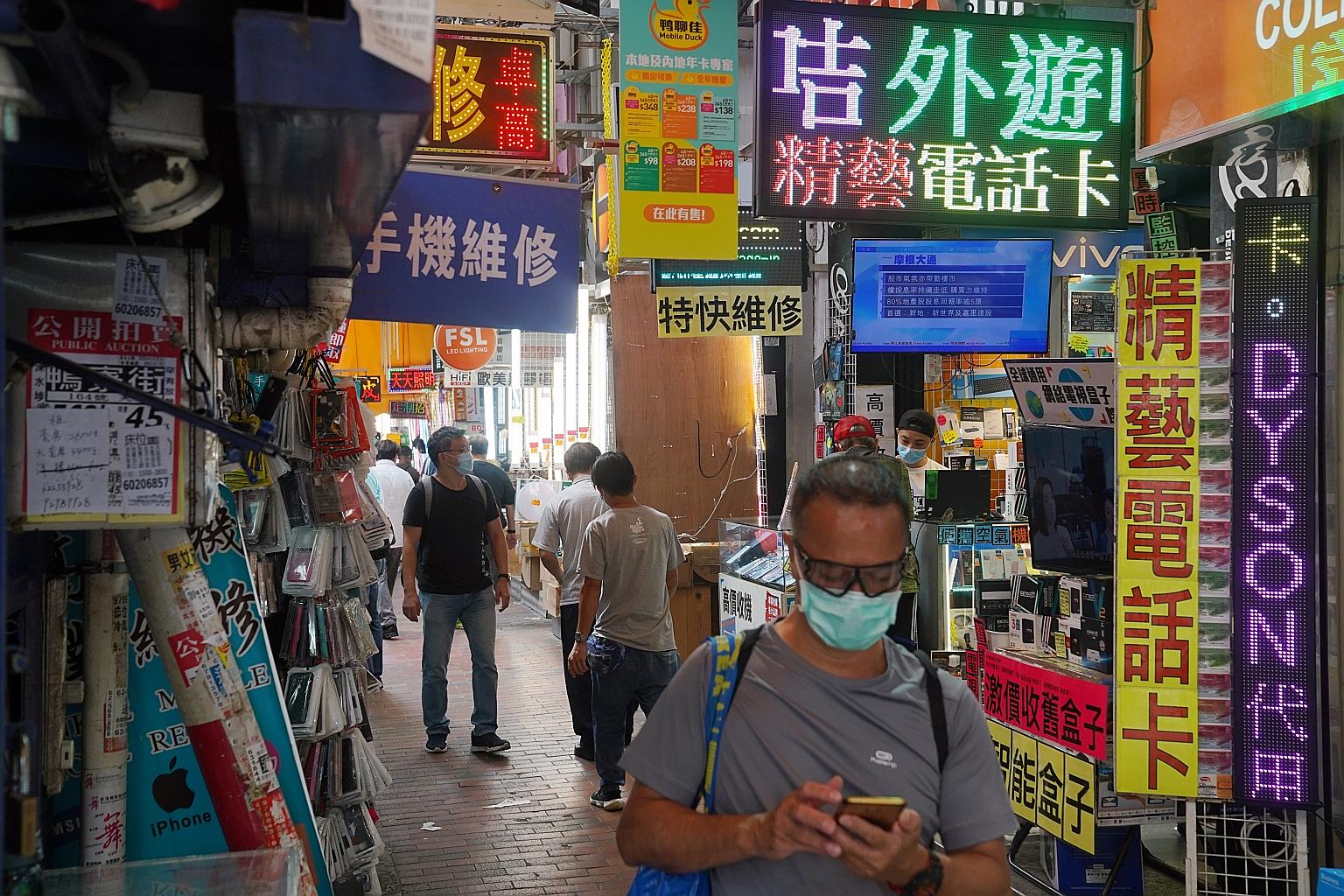Coronavirus pandemic
HK economy in dire straits as cases spike
Virus resurgence, uncertain political outlook imperil brief signs of recovery
Sign up now: Get insights on Asia's fast-moving developments

Economists forecast an 8.7 per cent contraction for Hong Kong's economy in the second quarter from year-ago levels, almost equalling the record 8.9 per cent decline posted in the first quarter.
PHOTO: REUTERS
Follow topic:
HONG KONG • Hong Kong's economy just cannot catch a break.
Having briefly shown signs of recovery in recent months from its deepest recession on record, the Asian financial hub is bracing itself for its stiffest test yet as a resurgent virus combines with an increasingly uncertain political and financial outlook.
Hong Kong is facing fundamental questions about its long-term role as an international finance centre, amid signs that technology firms are abandoning the city and global companies are spurning its once-vaunted legal system after imposition of a national security law.
While that is happening, the more immediate prospects for growth are deteriorating by the day as the coronavirus case count spikes.
"There is no light at the end of the tunnel; we have written off any possible chance of profits for the rest of the year," said Mr Douglas Young, co-founder and chief executive of lifestyle and fashion retail chain Goods of Desire.
"In the long term, I am optimistic that we shall get over this crisis, but our lives will be different."
Hong Kong will have an update on Wednesday on where things stand when the government reports second-quarter economic growth figures. Economists forecast an 8.7 per cent contraction from year-ago levels, almost equalling the record 8.9 per cent decline posted in the first quarter.
The city reported 123 new infections yesterday, a new daily record, bringing the total tally to 2,372, with 16 deaths.
Hong Kong's sudden spike in coronavirus cases may have stemmed from its willingness to let seafarers skip quarantine while changing ships in the city, a leading health expert said. Most of the new cases were locally transmitted.
Some health experts have blamed an exemption from the usual 14-day quarantine which the government granted to "essential personnel", including cross-boundary truckers, air crew and sea crew. But officials have said the arrangement was necessary, while insisting it was a "misunderstanding" that the new wave was attributable to the exemption.
After analysing virus samples from recent confirmed cases, Professor Gabriel Leung, dean of the University of Hong Kong's medical school, said on Thursday that the virus' resurgence most likely stemmed from such imported cases.
He said the wave was "probably because of the multiple imported (cases); it could be the crew members or sailors exempted from quarantine".
"When they entered Hong Kong, there were no immediate quarantine measures or testing arrangements. You could imagine, some of the crew members, the hotel they stay in, maybe, is downtown," Prof Leung said.
He added that with the relaxation of social distancing measures last month, small restaurants had become high-risk venues, especially those frequented by taxi drivers.
The government has extended civil servants' work-from-home plan for another week, to Aug 2, according to a statement on its website. While urging residents to stay at home, Hong Kong's government as yet has not mandated a full lockdown.
Empty storefronts are becoming a common scene in the city's shopping districts, where a little more than a year ago, they were packed with tourists.
Causeway Bay on Hong Kong Island had a vacancy rate of 7.9 per cent in the second quarter, compared with zero a year earlier, while Mong Kok in Kowloon has a vacancy rate of 24 per cent, quadruple that of a year ago, according to property broker Cushman & Wakefield.
"I am not feeling optimistic about the outlook for the city because there are lots of uncertainties," said Mr Tommy Wu, senior economist with Oxford Economics in Hong Kong. He forecasts a 9.5 per cent contraction year on year in the second quarter, and a 6 per cent decline in gross domestic product for this year.
"If the third wave of virus infections prolongs, I would expect a much greater wave of business closures in the coming months," he added.
Mr Samy Redjeb, managing director of luxury brands distributor The Bluebell Group, said: "The only positive of Hong Kong was the pandemic was under control until the end of June, when sales picked up slightly, and now that is gone.
"Borders are not reopening soon, and after a year of downtrend, and the constant battle on rents, many retailers are facing difficult questions as to their future in the city. It is extremely sad."
BLOOMBERG, AGENCE FRANCE-PRESSE

